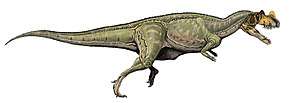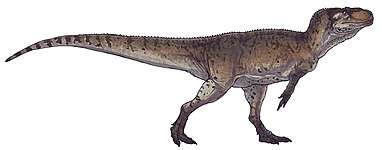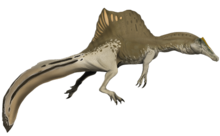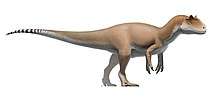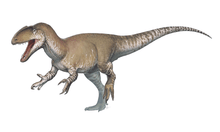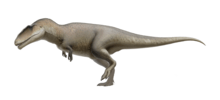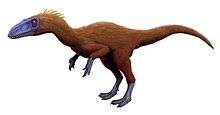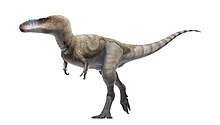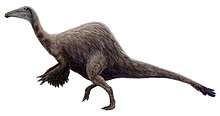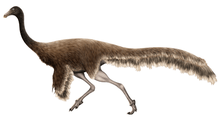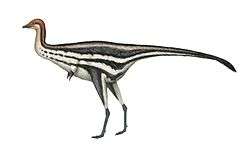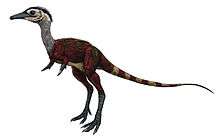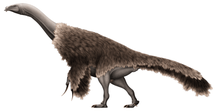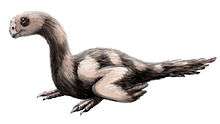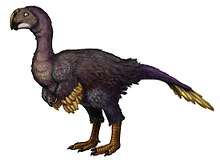Suskityrannus
Suskityrannus (meaning "coyote tyrant", suski meaning "coyote" in Zuni) is a genus of small tyrannosauroid theropod from the Late Cretaceous in southern Laramidia. It contains a single species, Suskityrannus hazelae, believed to have lived roughly 92 million years ago.[5] The type specimen was found in the Turonian-age Moreno Hill Formation of the Zuni Basin in western New Mexico.[6]
| Suskityrannus | |
|---|---|
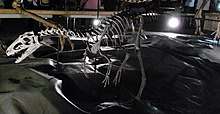 | |
| Reconstructed skeleton at the Dinokingdom exhibition, Tokyo | |
| Scientific classification | |
| Kingdom: | Animalia |
| Phylum: | Chordata |
| Clade: | Dinosauria |
| Clade: | Saurischia |
| Clade: | Theropoda |
| Clade: | Tyrannoraptora |
| Superfamily: | †Tyrannosauroidea |
| Clade: | †Pantyrannosauria |
| Genus: | †Suskityrannus |
| Species: | †S. hazelae |
| Binomial name | |
| †Suskityrannus hazelae Nesbitt et al., 2019 | |
Description
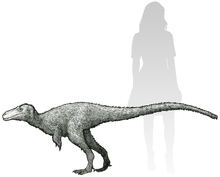
The two specimens of Suskityrannus stood roughly 1 metre (3.3 ft) tall and 3 metres (9.8 ft) long and likely weighed between 20–40 kilograms (44–88 lb). Both are likely to have been juveniles.[7] One of the specimens is believed to have been 3 years old when it died, based on bone rings. The skull of Suskityrannus and its foot are more slender than other tyrannosaurs.[8] The species already possesses many key features of the tyrannosaurid body plan, including the phylogenetically earliest record of an arctometatarsalian foot in tyrannosauroids. Additionally, as an early tyrannosaur, Suskityrannus may have had feathers, despite no feathers being found with its fossils.
Doug Wolfe noted that the brain of Suskityrannus was relatively large compared to its body plan.
Discovery and naming
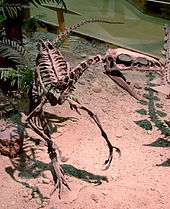
First mentioned as a small dromaeosaurid by Wolfe and Kirkland in their description of Zuniceratops,[9] Suskityrannus was informally referred to as the "Zuni coelurosaur",[10] "Zuni tyrannosaur",[11] and by the documentary Planet Dinosaur of 2011 "Zunityrannus" prior to its scientific description.[12] The original fossils were found by Robert Denton, a professional geologist from Virginia, and a native Mesa teen Sterling Nesbitt, who was a museum volunteer that came to a dig with paleontologist Doug Wolfe.[13][14][15] In 2019 Suskityrannus was formally described as a genus of primitive tyrannosauroid.[3][16] Both the holotype specimen MSM P4754 (partially articulated skull and a few postcranial bones) and the paratype specimen MSM P6178 (partially articulated and associated remains including a few skull bones and an incomplete postcranial skeleton) are preserved in the collections of the Arizona Museum of Natural History.[3]
Classification
Below is the phylogenetic analysis on the placement of Suskityrannus.[3]
| |||||||||||||||||||||||||||||||||||||||||||||||||||||||||||||
Paleobiology
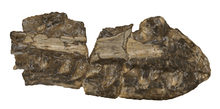
The area in New Mexico where Suskityrannus lived is an area rich in fossils. The fossil record of the Moreno Hill Formation documents a transition period between early Cretaceous fauna and the latest Cretaceous fauna. The area was a thickly forested coastal region with a humid climate. Zuniceratops, Nothronychus, and a few specimens of Jeyawati[16][17] are known from this region.[18][19][20] The formation also contains a currently undescribed ankylosaurid dinosaur.[21] Fossils of a crocodilian and a possible marine turtle belonging to the Cheloniidae, were also found in the same locality as well.[2]
Suskityrannus filled the major phylogenetic, morphological and temporal gaps that researchers needed to piece together tyrannosauroid evolution.[22]
References
| Wikimedia Commons has media related to Suskityrannus. |
- "†Suskityrannus Nesbitt et al. 2019 (coelurosaur)". PBDB.
- "Mirror Mesa (MSM) (Cretaceous of the United States)". PBDB.
- Wolfe, D.G.; McDonald, A.T.; Kirkland, J.I.; Turner, A.H.; Smith, N.D.; Brusatte, S.L.; Loewen, M.A.; Denton, R.K.; Nesbitt, S.J. (6 May 2019). "A mid-Cretaceous tyrannosauroid and the origin of North American end-Cretaceous dinosaur assemblages" (PDF). Nature Ecology & Evolution. 3 (6): 892–899. doi:10.1038/s41559-019-0888-0. PMID 31061476.
- See Gradstein et al. (2004) for a detailed description of the ICS' timescale
- Temming, M. (7 May 2019). "A tiny mystery dinosaur from New Mexico is officially T. rex's cousin". Science News. Retrieved 14 May 2019.
- "Fossils of 3-foot-tall Tyrannosaurus rex relatives are evolutionary stepping stone". CNN Wire. 6 May 2019.
- Schuster, R. (6 May 2019). "Mini Tyrannosaur Struck Fear Into Hearts of Jurassic Proto-rabbits Everywhere". Haaretz. Retrieved 6 May 2019.
- Sexton, C. (6 May 2019). "Newly named Tyrannosaurus Rex cousin was only three feet tall". Earth.com.
- Wolfe, D.E.; Kirkland, J.I.; Smith, D.; Poole, K.; Chinnery-Allgeier, B.; McDonald, A. (1998). "Zuniceratops christopheri n. gen. & n. sp., a ceratopsian dinosaur from the Moreno Hill Formation (Cretaceous, Turonian) of west-central New Mexico". Lower and Middle Cretaceous Terrestrial Ecosystems. New Mexico Museum of Natural History and Science Bulletin. 14: 307–318 – via Academia.
- "When Dinosaurs Roamed America". Discovery channel.com. Archived from the original on 2001-08-01.
- "Zuni Tyrannosaur Skull with base". Gaston design, Inc. Archived from the original on 2018-09-20.
- Mortimer, M. "Coelurosauria". theropoddatabase.com. Retrieved 9 May 2019.
- Berman, R. "Found in New Mexico: A tiny cousin of the T-Rex". Big Think. Retrieved 13 May 2019.
- Collom, L. (8 May 2019). "Teen's fossil find leads to discovery of new dinosaur, a tiny relative of T. rex". Arizona Republic.
- "Zuni Tyrannosaur Skeleton". Gaston Design, Inc. Retrieved 9 May 2019.
- McDonald, A.T.; Wolfe, D.G.; Kirkland, J.I. (May 2010). "A New Basal Hadrosauroid (Dinosauria: Ornithopoda) from the Turonian of New Mexico". Journal of Vertebrate Paleontology. 30 (3): 799–812. doi:10.1080/02724631003763516 – via ResearchGate.
- Lucas, S.G.; Heckert, A.B. (2000). "Cretaceous Dinosaurs in New Mexico" (PDF). Dinosaurs of New Mexico, New Mexico Museum of Natural History and Science Bulletin. New Mexico Museum of Natural History and Science. 17: 83–90.
- "Nothronychus mckinleyi". The Paleobiology Database.
- "Zuniceratops". The Paleobiology Database.
- Pringle, H.; Delin, G. (1 August 2001). "The Creature From the Zuni Lagoon". Discover (AUGUST 2001). Retrieved 6 May 2019.
- Sterling J. Nesbitt; Robert K. Denton Jr; Mark A. Loewen; Stephen L. Brusatte; Nathan D. Smith; Alan H. Turner; James I. Kirkland; Andrew T. McDonald; Douglas G. Wolfe (2019). "Supplementary information for: A mid-Cretaceous tyrannosauroid and the origin of North American end-Cretaceous dinosaur assemblages" (PDF). Nature Ecology & Evolution. 3 (6): 892–899. doi:10.1038/s41559-019-0888-0. PMID 31061476.
- "Tiny Tyrannosaur trod lightly 92 million years ago". Cosmos (7 May 2019).
